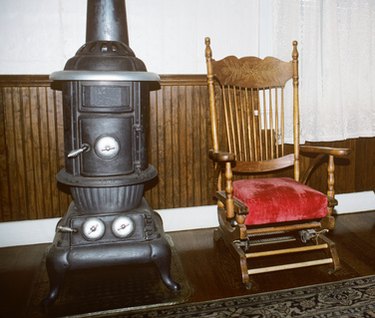Things You'll Need
Trowel
Furnace cement
Small bucket
Water

If you have just installed a stove pipe in your house, your first inclination may be to seal the pipe to prevent smoke from leaking into your house. Small cracks in the joints of a stove pipe tend to draw air in, which prevents the cracks from allowing smoke to escape. Before deciding that your stove pipe needs a sealant, test your stove a few times and see if there is any smoke leakage.
Step 1
Test your stove to see if there is any leakage of smoke into your house. If there is none, you may not need to seal your pipe at all. If there is some leakage, move on to step 2.
Video of the Day
Step 2
Examine your chimney for any blockages or an excess of dirt. Sometimes a clogged chimney can be the cause for smoke leaking into the house. If you see any problems, contact a professional to clean out the chimney, as these chemicals can be toxic. After cleaning, test your stove out again. If smoke is still getting into the house, move onto step 3.
Step 3
Allow the stove pipe to cool. Prepare your mixture of furnace cement and water in the bucket. Use cement that is specifically geared toward withstanding high temperatures. Mix the cement and water to the specifications listed on the package.
Step 4
Apply the cement by pressing it into the joints of the stove pipe where the pieces overlap. Use the trowel to scrape off the excess cement while holding it at a 45 degree angle. Scrape the extra cement back into the bucket.
Step 5
Wait for the cement to harden before testing the stove. Depending on the instructions for drying on the cement package, it may dry overnight or require electric fans. Once the cement is dry, test out the fireplace for smoke leakage.
Video of the Day